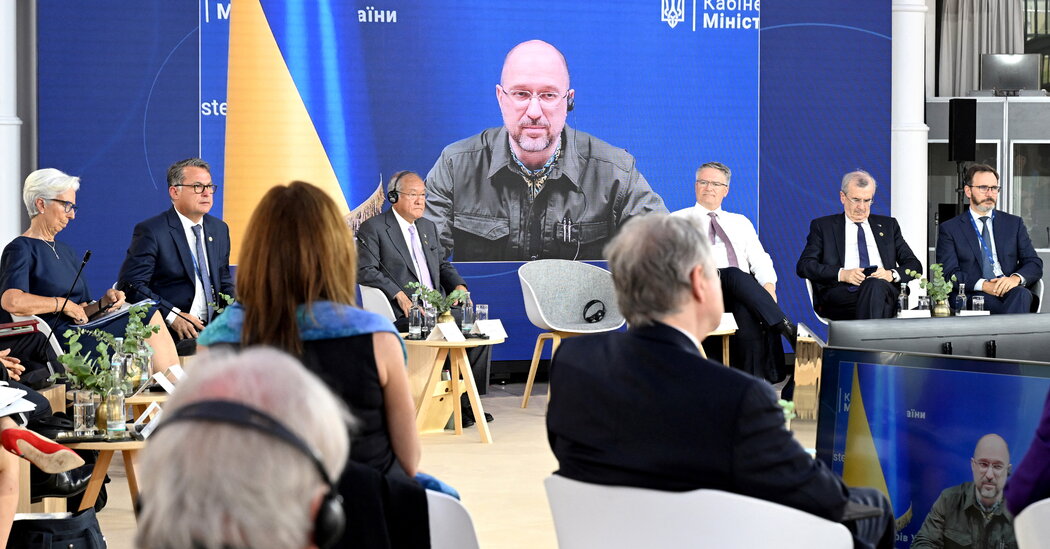KÖNIGSWINTER, Germany — Top economic officials from the world’s advanced economies moved closer toward agreement on a global rescue package for Ukrain
KÖNIGSWINTER, Germany — Top economic officials from the world’s advanced economies moved closer toward agreement on a global rescue package for Ukraine on Thursday, with finance leaders negotiating the details of a multibillion dollar plan to keep the Ukrainian government operating amid Russia’s onslaught.
Finance ministers of the Group of 7 nations expressed optimism about the emergency financing deal on the first day of a two-day summit, where they are focused on how to provide aid to Ukraine and exert pressure on Russia while avoiding economic blowback that will slow the global economy. Officials have been consumed with how to contain rising food and energy prices that have some economists worrying about a global recession.
Treasury Secretary Janet L. Yellen said at the end of the first day of meetings that the G7 was prepared to spend what is necessary to help Ukraine.
“There were general expressions of support,” Ms. Yellen said. “All of us pledged to do what’s necessary to fill in the gap.”
She added: “The message was ‘we stand behind Ukraine, we’re going to give them the resources they need to get through this.’”
The gathering on the outskirts of Bonn came as the United States Senate passed a $40 billion aid package for Ukraine on Thursday. The Biden administration is prepared to dedicate $5 billion of those funds to help sustain Ukraine’s daily government operations for three months, and American officials have been pressing its allies to contribute another $10 billion.
European Union officials said this week that they were prepared to contribute 9 billion euros in economic assistance loans to Ukraine but that the nations within the E.U. would need to provide guarantees to back the program.
“We have to secure the liquidity of the Ukrainian state,” Christian Lindner, Germany’s finance minister, said as the meetings convened. “We feel responsible for the capability of the Ukrainian state and its people to defend themselves.”
The International Monetary Fund and Ukrainian officials have said the country needs $5 billion per month to continue paying government salaries and pensions and to cover other expenses.
The terms of the aid package were a central topic of discussion at the meetings this week. Treasury Department officials have been encouraging their counterparts to offer grants to Ukraine instead of loans and are pushing for any loan terms to be as favorable as possible.
“I am getting more optimistic,” Kristalina Georgieva, the I.M.F.’s managing director, said on the sidelines of the Group of 7 meetings, referring to the plan to fill Ukraine’s financial gap. “The issue will be the timing.”
Ukraine’s prime minister, Denys Shmyhal, joined the meeting remotely and said afterward that they discussed “practical steps” to help Ukraine recover from the war.
“Despite Russia’s efforts to destroy our economy, together we will win!” Mr. Shmyhal said on Twitter.
The economic diplomats are gathering at a time of rising food and energy prices that threaten to blunt global growth. Ms. Georgieva said that central banks around the world were facing a difficult task as they try to tame inflation with higher interest rates without causing downturns. She warned that additional inflationary shocks could be in store.
“The problem is, at what cost?” Ms. Georgieva said. The question, she said, is “how to navigate it so you don’t get into recession.”
And the challenge is getting harder, she added: “We have a crisis upon a crisis,” she said.
China represents another risk to the global economy, Ms. Georgieva said, because of the strict “zero-Covid” lockdown policies it is employing to contain the coronavirus. She suggested that China’s economic fundamentals were sound but said that policymakers were closely watching the potential impact that lockdowns are having on supply chains and inflation.
Policymakers are also discussing additional rounds of sanctions on Russia, how the European Union can wean itself off Russian energy and growing fears about global food insecurity. The World Bank said on Wednesday that it was committing $30 billion over the next 15 months to projects that will encourage food and fertilizer production and remove barriers to trade.
Ms. Yellen said that no final decisions had been made about how the European Union would go about reducing its consumption of Russian oil, but that while the final decision is up to Europe the United States has been offering suggestions.
The Treasury secretary pointed to tariffs or price caps as possible options that could be enacted, the latter of which would essentially create a buyer’s cartel to limit how much revenue Russia can get for its oil. Europe is considering a proposal to end its reliance on Russian oil by the end of the year, but the United States has been concerned that the process could lead to a spike in energy prices globally.
“The objective is to keep some Russian oil flowing to the market to hold down global prices so we don’t have undo negative impacts on third countries,” Ms. Yellen said. “That depresses demand, it raises inflation and stagflationary types of shocks.”
www.nytimes.com
